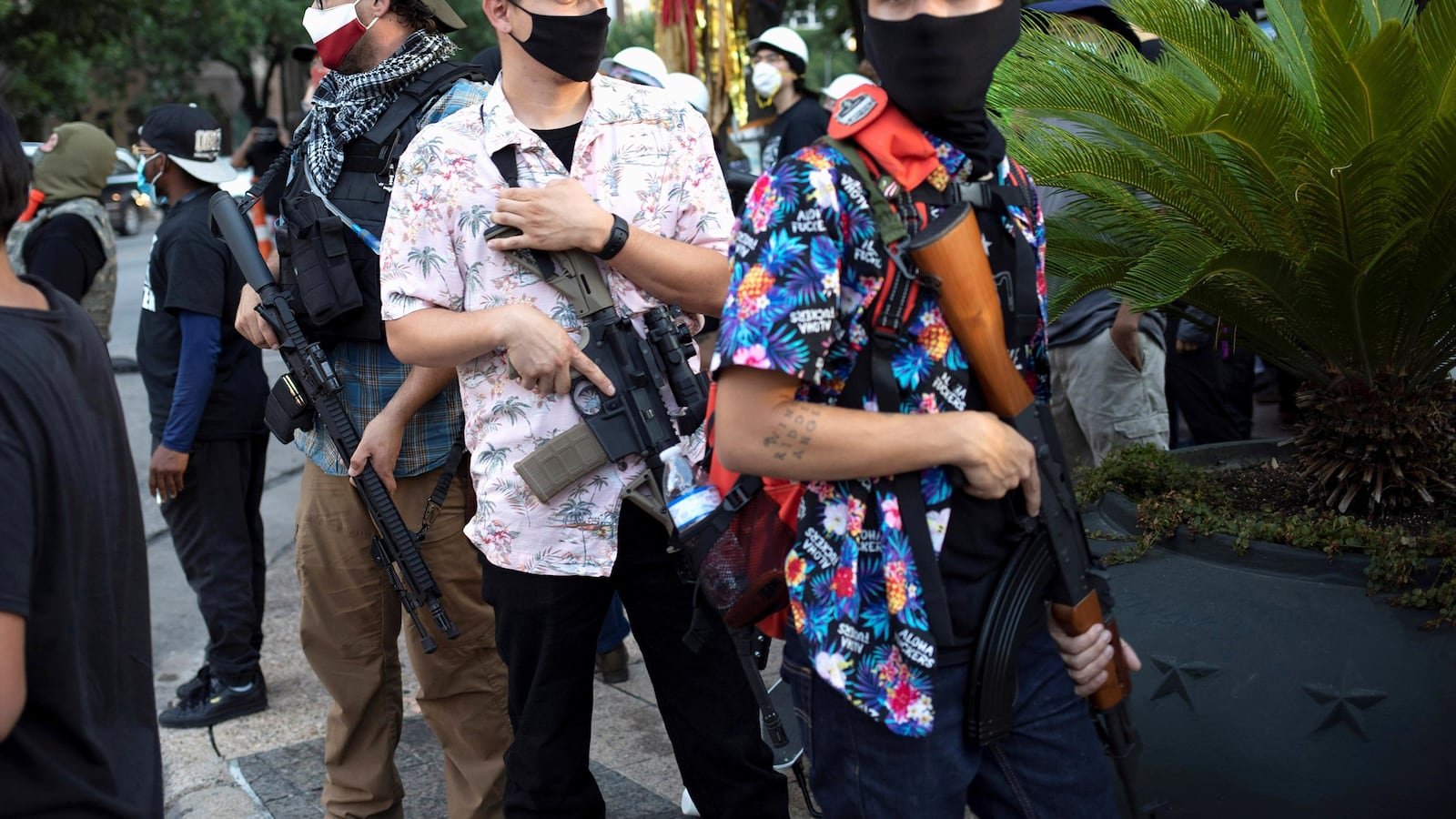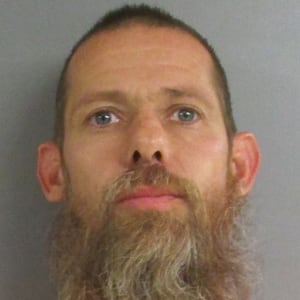A Madison Heights, Michigan, man killed by FBI agents during a still-murky standoff over a weapons warrant. Thirteen other Michigan and Delaware men arrested in state and federal busts over alleged plots to take over the state government. A Maryland man busted on federal weapons charges. A Virginia man arrested for allegedly violating a local open-carry law.
At least four state and federal busts—and, in one case, a local arrest—have targeted the so-called “Boogaloo” movement over the past week. A loosely affiliated but broadly right-wing and libertarian collective, Boogaloos have been on federal radar over the past year, a period during which adherents have been involved in multiple alleged violent plots and murders.
But this week’s crackdown on Boogaloo types suggests a new law enforcement focus, even as it raises questions about a possible surge in far-right organizing.
“It could be that law enforcement are paying more attention to these groups,” Mike German, a former FBI agent who specialized in extremist groups, told The Daily Beast. “But it could also be an indicator of increasing activity,” on the part of Boogaloo believers, he added.
Mike Dunn, a Boogaloo follower who was arrested on Thursday night, said the movement had taken note of the busts, and were expecting more.
“A lot of people are—I wouldn’t say they’re exactly worried—they’re stressed,” Dunn told The Daily Beast.
Dunn was popped at a rally in Newport News, Virginia, after he allegedly refused to comply with a local law against open-carrying a gun on public property. Elsewhere, large Boogaloo Facebook groups (those that have evaded the site’s bans on the ideology) have been mum on the spree of arrests—a contrast from earlier in the year, when some claimed arrests of Boogaloo believers were evidence of some kind of law-enforcement conspiracy.
The decentralized Boogaloo scene is home to multiple ideologies, leading to frequent confusion about what adherents actually believe. It’s a confusion that some followers actively cultivate. “Their goal is propaganda and if they can be a little blurry about what their ideology is, then they can attract more people who are interested in their goal, which is starting civil war,” German said.
The “Boogaloo” name originated from a racist meme about a white supremacist uprising, “Civil War 2: Electric Boogaloo,” as some members of the scene called it. In late 2019, the movement began solidifying around a more libertarian and (at least in name) race-blind message, drawing particular support from gun-rights activists and the world of right-wing anti-government movements. Central themes of Boogaloo messaging included targeting federal agents: Boogaloo adherents are accused of killing two federal agents in ambush attacks this spring, and others are accused of planning to incite violence at a Black Lives Matter protest.
Memos from federal agencies like the FBI and the Naval Criminal Investigative Service have flagged the Boogaloo as a source of concern this year, as the Intercept previously reported. Dunn, who was himself employed by the Department of Corrections until recently, said he’d sat through government briefings on extremist groups for work, and that he suspected he and his movement are now the subjects of such internal warnings.
The movement exploded back into the national consciousness on Thursday after the arrests of two groups of men—six by the FBI, seven by state authorities—in alleged plots to storm the Michigan capitol, kidnap Gov. Gretchen Whitmer, and start a civil war. At least some of the accused were bona fide Boogaloo adherents, according to their social media posts and affidavits in the case. The “Wolverine Watchmen,” the group of seven busted by state officials, trained for the “boogaloo” together and their leader went by “Boogaloo Bunyan” online, according to an affidavit.
“They usually in the briefings give talks about extremist groups and being worried about an uptick in militant activity,” Dunn said of law-enforcement agencies, before threatening a new armed event of his own.
“They’re probably going to get a different briefing soon because I’m showing up outside their precinct with a lot of men armed to the teeth on Thursday,” Dunn told The Daily Beast.
He also claimed to have been interviewed by federal authorities about an undisclosed incident earlier this year, but declined to give further details. The FBI declined a request for comment.
The Michigan arrests that made waves on Thursday weren’t even the first against Boogaloo believers in the state this month. On October 2, FBI agents shot and killed 43-year-old Eric Allport in Madison Heights, Michigan, while serving a warrant for an alleged weapons offense. The FBI claims Allport fired first at agents, although the incident is under investigation.
Allport was a Boogaloo adherent, his social media indicated. He was also associated with previous right-wing anti-government movements, the Detroit News reported. As a teenager, he and his family were friends and neighbors of the Weavers, a white supremacist-linked family, members of which were killed during the Ruby Ridge standoff with federal agents in 1992. Allport became a martyr for the Boogaloo movement after his killing by FBI agents last week. Dunn, the Virginia Boogaloo adherent, has made videos valorizing Allport.
Meanwhile, 39-year-old Frank Perry was arrested by FBI agents on Wednesday for alleged firearms offenses, the Baltimore Sun first reported. A criminal complaint accuses him of committing a felony by owning multiple guns despite a past burglary conviction, which barred him from doing so. Perry’s social media posts, likes, and profile picture suggest a strong involvement in the Boogaloo movement.
Dunn’s arrest appeared to be the only one that was not coordinated in advance (although he accused police of targeting him). Dunn, 19, was carrying a handgun at a Libertarian rally on Thursday night, in violation of a new law that prohibited open carry on public property, according to reporter Ford Fischer.
Dunn told The Daily Beast that he disagreed that he was open carrying (the gun was under his jacket, he claimed), but that the specifics didn’t matter because he is too young to legally carry a concealed weapon in Virginia. He said he refused to remove the gun because he thought the gun law was unconstitutional.
He said he anticipated being arrested again. “I’m gonna back and do the same thing and go through the whole process again,” he said.







